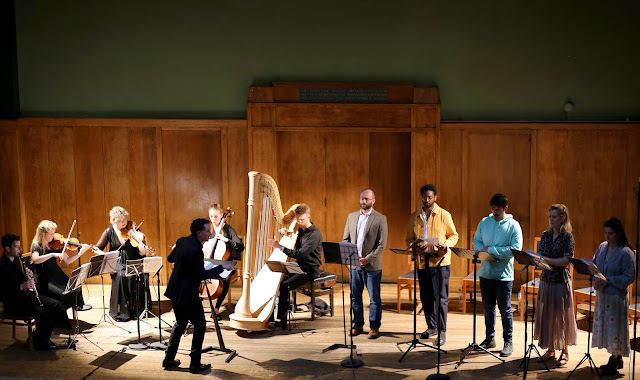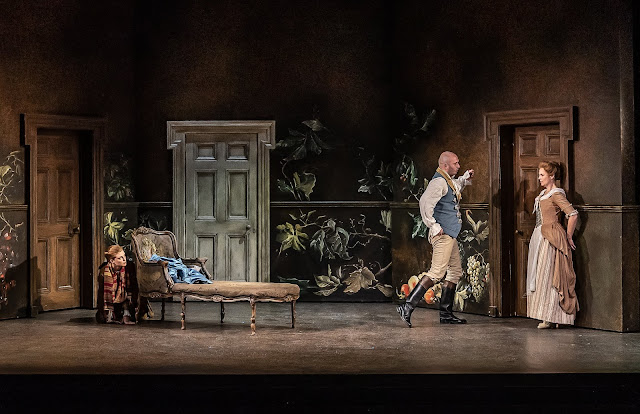 |
| Verdi: Un ballo in maschera - Georgia Mae Bishop - Opera Holland Park young artists performance 2019 (Photo Frances Marshall / Marshall Light Studio)* |
Reviewed by Robert Hugill on 28 June 2019
The annual Young Artists Performance at Opera Holland Park
 |
| Verdi: Un ballo in maschera - Adriano Grazini, Claire Lees Opera Holland Park young artists performance 2019 (Photo Frances Marshall / Marshall Light Studio) |
This was in fact the second performance by this cast, as on 26 June they gave the schools matinee [you can see a video of the terrific reaction they received on Opera Holland Park's Facebook page]. Nadine Benjamin had also gone on as Amelia with the main cast as cover for Anne Sophie Duprels earlier in the week, whilst Adriano Graziani performed two scheduled performances with the main cast.
Nadine Benjamin (making her debut performances in the role) made a poignant and expressive Amelia, her voice showing an obvious sympathy and affinity with Verdi's vocal lines. She shaped Amelia's music expressively and brought out the underlying seriousness and melancholy of the character, even in the rapturous Act Two duet this Amelia never quite got carried away. I do hope that we get to hear Benjamin in further Verdi roles soon.
Adriano Graziani was a lithe and bright-toned Riccardo, finely delineating the character's emotional journey from the devil-may-care attitude in the opening scene to his Act Three realisation that he must give up Amelia. In the earlier part of Act Three he seemed to tire somewhat, but rallied to give a powerfully moving death scene.
 |
| Verdi: Un ballo in maschera - Jack Holton, Blaise Malaba, Tom Mole - Opera Holland Park young artists performance 2019 (Photo Frances Marshall / Marshall Light Studio) |
Jack Holton was an impressive Anckarstrom. The role is quite stretch for a young baritone, and there were moments in Act Three when the lower reaches seemed not quite in focus yet, but he will certainly grow into it. Emotionally the performance was fully developed, the intense seriousness of Act One exploding into the furiously obsessive jealousy of Act Three. Rather impressively, 'Eri tu' was finely integrated into the performance rather than standing out as sometimes happens.
Georgia Mae Bishop made Madame Arvidson into a striking creation, bringing a very different physicality to it than Rosalind Plowright in the main cast, yet equally vivid. Bishop [who sang the role of the Mother in the premiere of my opera The Gardeners last week], mined a thrilling lower register to striking effect.
 |
| Verdi: Un ballo in maschera - Nadine Benjamin - Opera Holland Park young artists performance 2019 (Photo Frances Marshall / Marshall Light Studio) |
In the pit, Sonia Ben Santamaria drew a finely fluid and flowing account of the opera from the City of London Sinfonia.
With a different cast, other aspects of the production were thrown into relief, but I have to admit that I found the concept of Act Two no more successful than I did at the premiere. Associate director Rachael Hewer and the cast had worked hard to integrate with Rodula Gaitanou's production, keeping to the concept yet giving highly personal performances.The result was a performance of the complex opera which had a surprising depth and maturity.
 |
| Verdi: Un ballo in maschera - Claire Lees, Sonia Ben Santamaria - Opera Holland Park young artists performance 2019 (Photo Frances Marshall / Marshall Light Studio) |
The scheme relies on your support and you can find out more from the Opera Holland Park website.
Elsewhere on this blog
- From Supersize Polyphony to choir creation: I chat to Christopher Monks of Armonico Conso - interview
- Musically Satisfying: Hansel & Gretel at Grange Park Opera (★★★★) - opera review
- Leonardo: Shaping the Invisible (★★★½) - I Fagiolini - CD review
- Distinctive, uncompromising, theatrical: the music of Erika Fox revealed on the Goldfield Ensemble's Paths from NMC (★★★½) - CD review
- Pacey, intimate & youthful: Mozart's comedy Le nozze di Figaro at the Grange Festival (★★★★) - opera review
- The Rake's Progress: Barbara Hannigan conducts a young cast at the Aldeburgh Festival (★★★★) - opera review
- Cycle of history: Daniel Slater's imaginative staging of Handel's Belshazzar at Grange Festival (★★★★★) - opera review
- Chineke! Chamber Ensemble in Saint-Saens, Wallen & Coleridge-Taylor at Wigmore Hall - (★★★★★) concert review
- Focus, concentration, engagement and enthusiasm: Gabrieli Roar in An English Coronation (★★★★★) - concert review
- Displaying their charms: Thomas Arne's The Judgement of Paris receives its first recording (★★★★) - CD review
- Gender bending Baroque: Lawrence Zazzo and Vivica Genaux swap genders and roles in this brilliant Baroque opera recital (★★★★) - CD review
- Garsington Opera: the UK stage debut of Offenbach's late opera comique Fantasio intrigues and engages - (★★★★½) opera review
- A sense of architecture: Philippe Herreweghe and Collegium Vocale Gent in Bach's Mass in B minor (★★★★½) - concert review
- Aldeburgh Festival: Knussen Chamber Orchestra's concert debut in Knussen, Takemitsu, Stravinsky, Britten, Schubert (★★★★★) - concert review
- Home




























%20Ali%20Wright.jpg)

%20Ali%20Wright.jpg)





